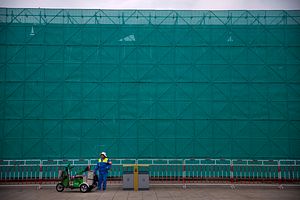On September 5, hotels in the vicinity of Tiananmen Square in Beijing gave their guests a notice. From Saturday, September 7 at 4:00 pm, to Sunday, September 8 at a then yet-to-be-determined time, guests staying in the hotel would not be able, under any circumstances, to go outside the hotel doors. Nor would they be able to enter the hotel if they were not already inside by Saturday at 4:00 pm.
The notice was clear. The word used by hotel management to describe this action translates as “martial law,” jieyan 戒严. A literal translation reads “strict ring.”
The reason? A huge swath of central Beijing would be shut down so that it’s military could rehearse the parade it is due to give on October 1, when the Chinese government will celebrate 70 years of Communist Party rule.
In the meantime, thousands of visitors to the capital were taken unawares. Transportation and accommodation schedules had to be hurriedly rearranged. Non-refundable, no-change policies on many flight tickets meant that travelers were forced to book new hotels outside the affected area, at the last minute, in order to be able to catch flights. Families visiting China to see the sights were suddenly told that they, and their children, could not go outside for at least 24 hours.
The result was that visitors to Beijing were trapped, either in the hotel, or outside of it completely, with nowhere else to go if they didn’t make it back in time.
If this was meant to be a lead-up to an anniversary that would shine a spotlight for the world to see the achievements of the Communist Party of China over the last 70 years, cavalierly locking up business travelers and tourists from all over that world might not have been the best public relations ploy to use.
The Communist Party of China has never been particularly good at public relations. Seventy years into its tenure leading China through good, bad, and awful, it has not advanced a capability to improve its public face, particularly to the world outside of China, by one jot.
In fact, its PR campaign, such as it is, has worsened in recent years.
This is partly because it is intrinsically and fundamentally confused over the difference in meanings between “public relations” and “propaganda.”
The party, as an authoritarian, non-democratic organization that firmly believes in its own right to remain unchallenged, and to prevail politically as the sole force dominating all aspects of Chinese politics, society, and business, uses coercion, rather than persuasion, to advance its interests, and its power.
It therefore answers to no one but itself, leading to ridiculous, almost embarrassing public relations disasters such as the one happening this month in Beijing.
For last weekend’s lockdown was only the first. As the South China Morning Post reports, “Other rehearsals are expected each weekend leading up to October 1.”
For those who try to “understand” China, a curious contradiction has always confounded that understanding. “Saving face” is supposed to be a key component of Chinese cultural behavior, yet the Communist Party in China as a whole seems to be oblivious to the loss of face it experiences when it engages in heavy-handed practices such as last week’s shutdown in Beijing.
And it isn’t as if it doesn’t care. It does, at least from a practical perspective. The party is making unprecedented forays into investment, infrastructure, and other business ventures throughout the world, largely through the Belt and Road Initiative (BRI). That initiative, however, is coming under increasing criticism internationally from target countries themselves, not only over broken promises, but also over unacceptable practices on the ground from Chinese teams sent to fulfill the projects which loans have made possible.
That pushback from the very countries that are supposed to be grateful to the PRC for its largesse is a massive public relations blow internationally. And the party doesn’t know how to fix it. As the catch phrase goes, “it’s simply not in its DNA.”
Authoritarianism is exactly what it says. People from democratic, pluralistic societies use reason and concepts of universal values in dialogue with authoritarian governments, and look for humane, thoughtful, considerate responses in return. They are frustrated when they don’t find them. The disconnect is that authoritarianism doesn’t take its power from the assent of the people, it takes its power from the submission of the people. Until that submission turns into revolt, which is how the Communist Party itself came to power — as it knows full well — then power is pretty much absolute.
Last Saturday’s little reminder in Beijing that the Communist Party of China can lock people up, including non-Chinese nationals, on a whim, at a moment’s notice, under no criminal charges, and with no avenue for discourse or appeal, should not go unnoticed or unremarked.
Up to a million Muslims are experiencing an exponentially more serious version of the same thing in Xinjiang Province, and for much longer than overnight. They are in camps, not hotels, with no recourse to leave whatsoever.
Last week’s lockdown incident in Beijing is indeed a metaphor for all relations with China.
The apocryphal statement that Winston Churchill makes in the movie Darkest Hour — “You cannot reason with a tiger when your head is in its mouth,” — can be shortened. You cannot reason with a tiger at all.

































